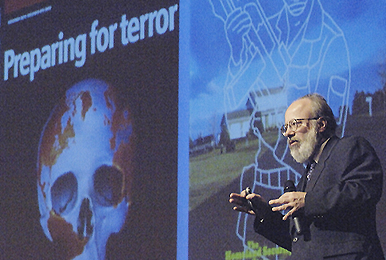Human rights at the root of bioethics
George Annas draws on history, poetry and science in University Lecture

If a terminally ill patient dies while undergoing experimental treatment, who is responsible? Should we use data from unethical medical experiments? Is the media doing enough to protect human rights? Does the international code of human rights really matter? Is there hope for humanity?
These are a few of the questions inspired by George Annas’ University Lecture last week, American Bioethics After Nuremberg: Pragmatism, Politics, and Human Rights. The multifaceted professor tackled a potentially dismal subject with perspective and humor in the annual lecture.
An often-quoted expert in bioethics, Annas is the Edward R. Utley Professor of Health Law, Bioethics, and Human Rights and department chair at the School of Public Health, a professor of sociomedical sciences at the School of Medicine, and a professor of law at the School of Law. While his fields of study are diverse, an underlying principle drives his work, and as he argued, connects the fields of law, medicine, and ethics: human rights.
He supported the premise of his lecture, that the Nuremberg Doctors Trial was the birth of modern bioethics, by historical evidence of what followed the trial — the civilized world’s adoption of the Nuremberg Code and the Universal Declaration Human Rights.
Annas’ conversational style was accompanied by slides of political cartoons and foreboding headlines and peppered with lines of contemplative text, quoting Telford Taylor, a U.S. prosecutor at the Nuremberg trials, T. S. Eliot, and John F. Kennedy.
By lightheartedly citing the 12 laws of the Boy Scouts of America (to be trustworthy, loyal, helpful, friendly, courteous, kind, obedient, cheerful, thrifty, brave, clean, and reverent), Annas pointed out the more serious nature of the doctor-patient relationship. “The first six are what patients want from their doctor,” he said. “The second six are what doctors want from their patients.”
After Nuremberg, American bioethics became more rooted in pragmatism, most recently exemplified, Annas said, in Vice President Dick Cheney’s request to allow the CIA to torture suspects. But pragmatism is often a weak defense; it was behind the experiments the Nazis performed on Jews during the Holocaust, testing, for example, how long it would take a man to freeze to death in new uniforms designed for German soldiers.
While the spotlight of medical ethics in America has shifted among issues such as life support, transplants, and other technological advances, its roots in human rights remind us to strive not only for ethical medical behavior, Annas said, but for equality worldwide.
He quoted JFK, who in a speech in June 1963, just after the Cuban missile crisis, urged America to seek common ground with its enemies:
So, let us not be blind to our differences — but let us also direct attention to our common interests and to means by which those differences can be resolved. And if we cannot end now our differences, at least we can help make the world safe for diversity. For, in the final analysis, our most basic common link is that we all inhabit this planet. We all breathe the same air. We all cherish our children’s future. And we are all mortal.
Annas also offered alternatives, some more serious than others, to the idea that Nuremberg was the beginning of bioethics, such as the writings of Hippocrates, the painting Raft of the Medusa (a 1818 painting by Theodore Gericault depicting survivors of a shipwreck after a doctor has thrown some overboard to save others; the figure who’s the symbol of hope is African, a nod to the promise of equality in the future), and Mary Shelley’s Frankenstein, “who was no doctor, but did things we think of doctors doing today, such as creating life.”
While cloning is often noted as today’s most controversial bioethics question, the research done as part of the Human Genome Project has at least changed the way we think about human dignity and equality, Annas said, quoting a London scientist who worked on the project: “We are all Africans under the skin.”
During the question and answer session, he answered some questions, such as “Is the media doing enough to draw attention to human rights violations?” with “That’s a good question,” and some with more direction. One person asked if a government’s adoption of the Universal Declaration of Human Rights was worthwhile, given that it is so often ignored in reality.
“It’s easy to be cynical,” Annas said, but reminded us to strive for equality. If the declaration doesn’t guide governments, it may still influence some multinational corporations, which can also have a powerful impact on the quality of life worldwide. “Our overall challenge now is to convince our government that it’s headed in the wrong direction,” he said, citing, among other things, President Bush’s characterization of terrorists as “‘without a heart or a conscience.’ They may not have a heart or a conscience,” Annas said, “but the question is, do we?”